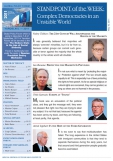
The topic of the issue is “Complex Democracies in an Unstable World.”
The world has no doubt entered a period of instability: a wave of revolutions has swept through the Middle East and North Africa, and crowds of nomads continue to assault more successful countries. How will this instability affect modern democratic institutions in polyethnic and multicultural societies? When European leaders talk about the failure of multicultural policy, are their statements made from a position of strength, a position of a subject capable of reconsidering chosen policies, or are they the words of frustrated statesmen facing a situation of almost irreversible migration processes? What policy can prove to be more successful than a policy of multiculturalism, if the latter has indeed really failed? Is it still feasible to find a set of common, universal values that can apply equally to groups of different people around the world ?
These and other questions will be considered by:
Thilo Sarrazin, a German politician and public figure, and the author of the much talked-of book, ‘Germany Does Away with Itself’; Ian Buruma, a journalist, writer, and the author of ‘Murder in Amsterdam: The Death of Theo van Gogh and the Limits of Tolerance’; Mark Urnov, an academic supervisor in the Faculty of Applied Political Studies at the National Research University – Higher School of Economics; Bakhyt Kenjeev, a poet, novelist, and award winner of numerous literary prizes; Arend Lijphart, an American and Dutch political scientist, and a prominent figure in political science; Maxim Shevchenko, a journalist working on national TV Channel One; Tariq Modood, a political scientist, and Director of the Center for Study of Ethnicity and Citizenship at the University of Bristol; Alexei Avtonomov, a member of the Committee on the Elimination of Racial Discrimination (UN); Craig Calhoun, President of the Social Science Research Council; and Valery Fadeev, Director of the Institute for Social Planning.

 0 height=15 style='margin:5px;'>
0 height=15 style='margin:5px;'>
